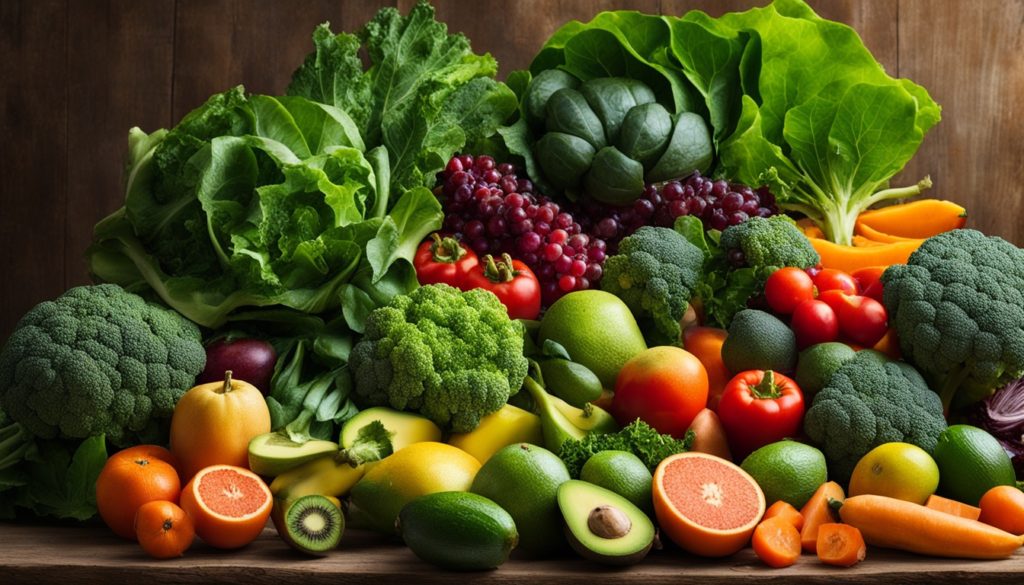Vitamin B9, known as folic acid, is vital for our health. It is key in making DNA, growing cells, and making red blood cells. Knowing about Vitamin B9 shows us how it helps our heart, mind, and during pregnancy. We’ll look at what folic acid does and where to find it in our food.
Key Takeaways
- Vitamin B9 is essential for DNA synthesis and cell growth.
- Folic acid plays a significant role in the formation of red blood cells.
- Understanding the importance of Vitamin B9 can promote better health practices.
- Identifying Folic Acid sources can aid in meeting daily nutritional requirements.
- The article will delve into the comprehensive benefits and sources of folic acid.
What is Vitamin B9 (Folic Acid)?
Vitamin B9, commonly known as Folic Acid, is key to our body’s functions. It’s needed for making and repairing DNA. This process is crucial for growth and development.

Definition and Role in the Body
Folic Acid is used by our bodies to make red blood cells. It helps in gene expression. It also aids in DNA and RNA repair, making it essential for cell growth.
This vitamin also helps break down amino acids. It prevents too much homocysteine, which is linked to heart disease.
Importance in Health
Vitamin B9 has vital roles in keeping us healthy. It prevents anemia and supports brain function. Also, it helps avoid birth defects like spina bifida in pregnancy.
This nutrient is crucial for heart health by managing homocysteine. It also benefits mental health by helping make neurotransmitters that affect mood.
Getting enough Folic Acid is important for your wellbeing. You can get it from food, fortified products, or supplements. For tips on keeping Vitamin B9 levels up, visit Health Care Navigator.
Health Benefits of Vitamin B9
Vitamin B9, or folic acid, is key for our health. It helps keep the heart healthy, improves how our mind works, and helps cells grow and repair themselves.
Cardiovascular Health
Folic acid helps protect our hearts. It lowers homocysteine levels, which can cause heart disease. So, it reduces the risk of strokes and heart issues. Studies show its big role in keeping hearts healthy for a longer life.

Mental Health and Cognition
Folic acid is also great for our minds. It boosts brain function and lowers the chance of mental health issues. It helps make neurotransmitters that are important for mood and sharp thinking. This is why folic acid is good for keeping our minds clear, no matter our age.
Cell and Tissue Growth
Folic acid is vital for cell growth and fixing tissues. It helps make DNA and cell division possible. These are needed for healing and growing. This is very important when the body is growing fast, like during pregnancy, babyhood, and the teen years.
Folic Acid in Pregnancy
Folic acid is very important during pregnancy. It offers many benefits to both the mother and her baby. This B-vitamin is key for the baby’s development and helps avoid many complications.
Benefits for Fetal Development
Folic acid does a lot for a growing baby. It helps make DNA which is needed for cell growth. It also helps form the neural tube, becoming the baby’s brain and spinal cord. This ensures these organs develop well.
Prevention of Birth Defects
Folic acid also prevents birth defects. It’s known to reduce the risk of neural tube defects like spina bifida and anencephaly. Pregnant women should get enough folic acid to lower these risks. It’s a vital part of prenatal care.
Moreover, folic acid cuts the risk of other issues like heart defects and cleft lip and palate. It helps with DNA synthesis, supporting the baby’s overall health and growth. Its role in a mother’s diet is truly important.
Vitamin B9 Sources
Finding sources of Vitamin B9 is key for good health. Known as folic acid, it comes from foods, fortified items, and supplements. This part will delve into these sources.
Natural Food Sources
Vitamin B9 is found in many foods. Leafy greens, fruits like oranges, and strawberries are rich in it. Also, legumes, seeds, and nuts are great natural sources.
Fortified Foods
To help meet daily needs, many foods have added folic acid. Cereals, bread, and pasta are often enriched. These fortified items boost your Vitamin B9 intake easily.
Supplementation
At times, food alone might not fulfill your folic acid needs. Considering Folic Acid supplements is a good option then. Supplements ensure you get enough Vitamin B9 for your health.
| Source Type | Examples | Advantages |
|---|---|---|
| Vitamin B9 Natural Sources | Leafy Greens, Fruits, Legumes, Nuts | Rich in other nutrients, naturally sourced |
| Fortified Foods | Cereals, Bread, Pasta | Convenient, easily added to daily meals |
| Folic Acid Supplementation | Vitamin B9 Pills, Multivitamins | Guarantees regular intake, well absorbed |
Adding Vitamin B9 from foods, fortified items, and supplements helps manage intake. It supports health well. For advice tailored to you, talking to a healthcare expert is wise.
Folic Acid Deficiency Symptoms
It’s important to spot and tackle Folic Acid deficiency symptoms early. Knowing the signs and dangers helps avoid serious health issues later.
Common Signs of Deficiency
Folic Acid lack shows through different symptoms, hitting wellbeing hard. Common signs include:
- Fatigue and overall weakness
- Shortness of breath and dizziness
- Pale skin and less hunger
- Trouble remembering or focusing
- Mouth sores
Catching these Folic Acid deficiency symptoms early helps fix them faster. This avoids worse health complications.
Risks and Complications
Not having enough folic acid for a while can mess up your body in big ways.
| Complication | Description |
|---|---|
| Macrocytic Anemia | Means bigger red blood cells. It makes you tired, weak, and short of breath. |
| Neural Tube Defects | If pregnant, low folic acid can cause serious baby birth defects like spina bifida. |
| Cardiovascular Issues | Lack of it can hurt heart health by raising homocysteine, leading to heart disease. |
| Mental Health Problems | Going without can cause depression and thinking troubles, hurting mental state. |
Fixing a folic acid shortage early helps you avoid these deficiency risks. It leads to a healthier life.
Recommended Daily Intake of Vitamin B9
The daily need for Vitamin B9, or folic acid, changes with age, gender, and life stages. It’s vital to know and meet these needs for good health.
Adults usually need about 400 micrograms (mcg) of Folic Acid. Pregnant women need more, around 600 mcg, to help the baby grow right and prevent birth defects. Women who are breastfeeding should get 500 mcg each day.
Let’s look at the needs for different groups:
| Age Group | Recommended Daily Intake (mcg) |
|---|---|
| Infants (0-6 months) | 65 |
| Infants (7-12 months) | 80 |
| Children (1-3 years) | 150 |
| Children (4-8 years) | 200 |
| Children (9-13 years) | 300 |
| Adolescents (14-18 years) | 400 |
| Adults (19+ years) | 400 |
| Pregnant Women | 600 |
| Breastfeeding Women | 500 |
Experts have deeply researched to find the right amount of Vitamin B9 needed. Not getting enough can harm your heart, brain, and more.
Knowing the right Vitamin B9 dosage for each stage of life is key. It makes sure we get the benefits we need for our health.
Vitamin B9 Rich Foods
Vitamin B9, known as folate, is key for making DNA and RNA. It helps make red blood cells and break down homocysteine. It’s important to eat foods rich in Vitamin B9. Foods like fruits, vegetables, legumes, nuts, and animal products, including fortified cereals, are good sources.
Fruits and Vegetables
Fruits and vegetables are great for getting Vitamin B9. Oranges, bananas, and melons are full of folic acid. Dark green veggies like spinach, kale, and broccoli are also rich in folate. They help keep cells working right and boost health.
Legumes and Nuts
Legumes are a top source of Vitamin B9. Beans, lentils, and chickpeas have lots of folate. Nuts such as peanuts and almonds also give you folate. Eating these along with fruits and vegetables ensures you get enough folate.
Animal Products and Fortified Cereals
Liver and other animal products are full of Vitamin B9. They help increase your folate levels. Eggs and dairy add a little folate too. Also, fortified cereals are an easy way to get your daily folate. For more on folate and its sources, see Harvard’s guide on folic acid.
How to Incorporate More Folic Acid into Your Diet
Getting enough Vitamin B9, or folic acid, is crucial for good health. We’ve gathered tips to boost your folic acid intake through food. Plus, you’ll find tasty recipes rich in Vitamin B9 to try out.
Dietary Tips and Tricks
- Eat Leafy Greens: Add veggies like spinach, kale, and romaine to your salads and smoothies.
- Choose Fortified Foods: Look for cereals, bread, and grains fortified with folic acid by checking the labels.
- Snack on Nuts and Seeds: Pumpkin seeds, sunflower seeds, and peanuts are packed with Vitamin B9.
- Include Beans and Legumes: Boost your folic acid with black beans, lentils, and chickpeas in soups, stews, and salads.
- Opt for Citrus Fruits: Oranges, grapefruits, and strawberries are great for upping your intake.
Recipes High in Vitamin B9
Try these Vitamin B9-rich recipes in your meals:
- Quinoa Salad with Kale and Citrus: Mix cooked quinoa, chopped kale, orange pieces, and lemon-tahini dressing for a tasty salad.
- Lentil Stew: Enjoy a hearty stew with lentils, carrots, celery, tomatoes, herbs, and spices.
- Stuffed Bell Peppers: Stuff peppers with black beans, corn, tomatoes, and brown rice. Add cheese and bake until golden.
- Spinach and Chickpea Curry: Cook chickpeas with spinach, onions, garlic, and ginger in curry sauce for flavor.
- Strawberry and Spinach Smoothie: For a fresh drink, blend strawberries, spinach, banana, and orange juice.
| Food Item | Folic Acid Content (mcg) |
|---|---|
| Spinach (1 cup) | 263 |
| Black Beans (1 cup) | 256 |
| Oranges (1 medium) | 40 |
| Lentils (1 cup) | 358 |
| Quinoa (1 cup) | 86 |
Our dietary advice and Vitamin B9-rich recipes make it easy to include more folic acid in your meals. With nutrient-dense foods and exciting recipes, boosting your folic acid is both simple and enjoyable.
Folic Acid Supplementation
Taking Folic Acid supplements can be key in keeping your health at its best, especially in certain situations. This part will help you know when to think about taking Folic Acid supplements. It will also guide you on choosing the right one. Plus, you’ll learn about safety tips and possible side effects.
When to Consider Supplements
It’s often suggested to take Folic Acid supplements if you’re not getting enough Vitamin B9 from food. This is especially true for pregnant women, people with certain health issues, and those who follow strict diets. Folic Acid is crucial for a baby’s growth in the womb. It helps avoid birth defects.
Choosing the Right Supplement
Picking the right Folic Acid supplement means looking at several important details. Make sure the supplement is tested for its quality and purity. Brands like Nature Made and Garden of Life are typically recommended. They meet strict testing criteria. Also, the supplement’s dose should match your healthcare provider’s suggestions to prevent too much intake.
Safety and Side Effects
Taking Folic Acid supplements is usually safe, but you should know there might be side effects. You could experience a slight upset stomach or a rash. Very rarely, high levels of Folate might hide a Vitamin B12 shortage. It’s crucial to stick to your healthcare provider’s instructions to stay safe.
| Factor | Recommendation |
|---|---|
| Brand Quality | Choose brands like Nature Made, Garden of Life |
| Dosage | Follow healthcare provider’s advice |
| Side Effects | Mild stomach discomfort, rash, rare masking of B12 deficiency |
The Importance of Vitamin B9 for Different Life Stages
Vitamin B9, also known as folic acid, is key to staying healthy at all life stages. It’s especially critical for pregnancy and as we get older. Let’s explore how it helps during these times.
Pregnancy and Early Development
It’s vital for pregnant women to get enough folic acid. It helps in the baby’s brain and spinal cord development. Not having enough can lead to serious issues, like neural tube defects.
The National Institutes of Health recommend pregnant women take at least 400 micrograms of folic acid every day.
Adulthood and Aging
As adults, we still need vitamin B9. It’s important for making and repairing DNA, which keeps our cells healthy. As we age, keeping up folic acid intake can help with brain health and slow cognitive decline.
It’s also connected to better heart health in older adults. We can get folic acid from our diet or supplements to stay healthy.
- Pregnancy Nutrition: Crucial for fetal development and birth defect prevention.
- Adulthood and Aging: Supports DNA synthesis, repair, and cognitive health.
Vitamin B9’s role is important at every stage of life. It’s a vital part of a healthy diet.
Conclusion
This guide has shown how important Vitamin B9, or folic acid, is for our health. It’s vital for growing cells, keeping the heart healthy, and mental well-being. It’s especially important for pregnant women to support the baby’s growth. This summary helps us see why we can’t miss out on this vitamin.
We looked at where to find Vitamin B9. You can get it from greens, fruits, legumes, and foods that have added folic acid. Adding these to what you eat every day helps avoid a lack of this crucial nutrient. It prevents health problems. This part of the guide shows that getting Vitamin B9 from our food is easy and offers many choices.
Knowing how much Vitamin B9 we need at different times in our life is key. Stay informed about how much you need to eat or if you should take supplements. This can help you enjoy the health perks we’ve talked about. Eating a diet with plenty of Vitamin B9 is a smart move for your health.
FAQ
What are the benefits of Vitamin B9 (Folic Acid)?
Vitamin B9 or Folic Acid is vital. It helps make DNA and grow cells. It’s also key for making red blood cells.
It supports heart and brain health, tissue growth, and cell function.
Why is Vitamin B9 important for health?
Vitamin B9 is key for healthy genes. It helps avoid too much homocysteine, which can harm the heart. It’s crucial for good health and prevents several health issues.
How does Folic Acid benefit cardiovascular health?
Folic Acid keeps homocysteine low, cutting heart disease risks. This includes fewer chances of stroke and heart attacks. Healthy blood vessels benefit the heart too.
What is the significance of Folic Acid in pregnancy?
During pregnancy, Folic Acid is crucial. It helps the baby grow correctly and avoids birth defects. Pregnant women need enough Folic Acid for the baby’s health.
What are the natural sources of Vitamin B9?
You can find Vitamin B9 in green veggies, beans, nuts, fruit, and fortified foods. These help meet your Folic Acid needs.
What are the common symptoms and risks of Folic Acid deficiency?
Lack of Folic Acid can cause tiredness, weakness, mood changes, and breathlessness. If not addressed, it may lead to anemia, birth issues, and heart disease risks.
What is the recommended daily intake of Vitamin B9?
Adults need about 400 micrograms of Vitamin B9 daily. Pregnant women should get 600 micrograms for the fetus’s health.
Which foods are rich in Vitamin B9?
Rich sources include spinach, kale, beans, nuts, liver, and fortified cereals. These foods are packed with Vitamin B9.
How can I incorporate more Folic Acid into my diet?
Eat a variety of meals with green veggies, beans, and fortified cereals. Trying new recipes with these foods can increase your Folic Acid intake.
When should I consider Folic Acid supplementation?
You might need extra Folic Acid if you’re pregnant or have dietary limits. Always talk to a doctor before starting supplements.


